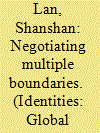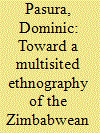| Srl | Item |
| 1 |
ID:
116599


|
|
|
|
|
| Publication |
2012.
|
| Summary/Abstract |
The 1997 return of the British colony Hong Kong to mainland China has prompted the largest exodus of Hong Kong migrants to western countries such as Australia, Canada and the United States in the 1980s and 1990s. While the transnational capital accumulation and life strategies of Hong Kong business elites has been well documented, little has been written on pre-1997 Hong Kong immigrants who are from non-elite backgrounds. Based on ethnographic research in Chicago, this article explores the flexibility and multifarious nature of identity construction among two generations of Hong Kong immigrants: those who arrived in the United States during the 1960s-1970s and those who did during the 1980s -1990s. I identify class positioning in the Chinese disaporic community and racialization experience in the larger U.S. society as two important factors in mediating the boundary making strategies of different groups of Hong Kong immigrants.
|
|
|
|
|
|
|
|
|
|
|
|
|
|
|
|
| 2 |
ID:
109983


|
|
|
|
|
| Publication |
2011.
|
| Summary/Abstract |
Classical diaspora scholars have constructed diasporic identities in essentialistic and unitary fashion, with phrases like the "Jewish identity," "Palestinian identity," and "Irish identity" denoting migrants as homogeneous ethnic communities. Using the author's multisited ethnographic research among Zimbabweans in Britain, the article explores the diverse ways in which diasporic identities are performed, expressed, and contested in Britain. On the basis of data from a pub, a gochi-gochi (barbecue) and the Zimbabwe Vigil, this article argues that the concept of diaspora, by emphasizing a static and singular conception of group identity, removes the particular ways in which diasporic life is experienced. The ethnographic "sites" were chosen to highlight different geographic settings to show the contrast between multicultural global cities and how different spaces of association attracted distinctive diasporic communities of race, ethnicity, gender, class, and legal status. The article identifies a pattern of diasporic identity development that largely uses the homeland as a frame of reference, and this is contrasted with alternative, hyphenated identities that challenge the fixation of identities to a specific place. It can be suggested that these diasporic identities are bottom-up forms of resistance to the institutionally ascribed refugee identity, perceptions of blocked social mobility, racism, and discrimination in the hostland.
|
|
|
|
|
|
|
|
|
|
|
|
|
|
|
|